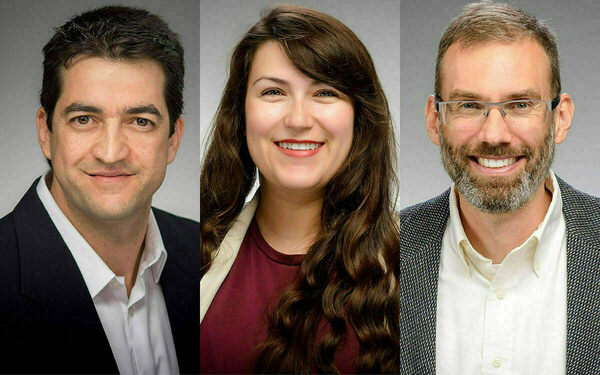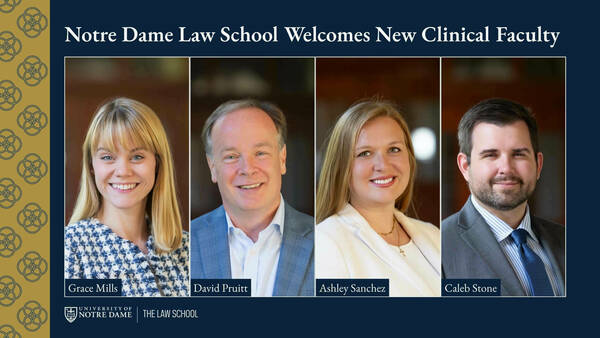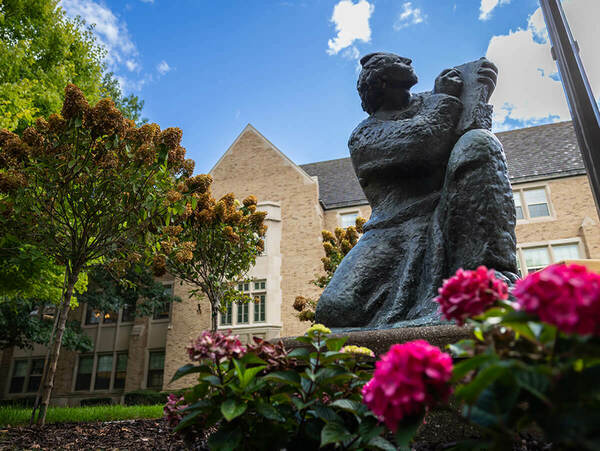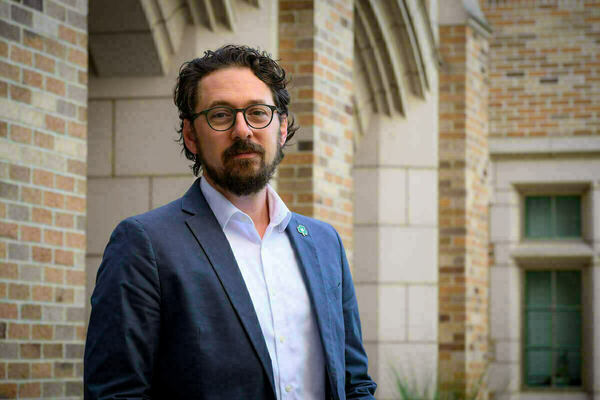Three Notre Dame researchers win NEH grants for humanities-based projects
Three University of Notre Dame researchers have been awarded significant three-year grants from the National Endowment for the Humanities in support of work related to the archeological aspects of Castel Sant’Angelo in Rome, contextualizing Catholic resistance in 20th-century central and eastern Europe, and the use of virtue ethics in generative artificial intelligence systems.
David Hernandez, the Eli J. and Helen Shaheen Associate Professor of Classics, and Morgan Munsen, senior research and partnerships program manager at the Nanovic Institute for European Studies in the Keough School of Global Affairs, have each won a NEH Collaborative Research grant. Thomas A. Stapleford, associate professor in the Program of Liberal Studies, is leading a team that has been awarded a Humanities Research Center on Artificial Intelligence grant.
The Notre Dame awards are among $34.79 million in grants announced by the NEH in August to support 97 humanities projects across the country.
“We are immensely proud of these Notre Dame scholars for receiving this federal funding to support their work on critical topics,” said Jeffrey F. Rhoads, the John and Catherine Martin Family Vice President for Research. “This financial support is a testament to the exceptional caliber of humanities scholarship done here, and it will enable these researchers to enrich public understanding and contribute to the vibrant intellectual life of our nation.”
Digging for more

Built in second-century Rome, Castel Sant’Angelo was initially created as a mausoleum for the Roman emperor Hadrian and his family — making it one of the most notable tombs in the world. Over the centuries, the towering rotunda was used as a fortress and residence for medieval Roman Catholic popes, and today, it serves as a museum that welcomes more than a million tourists each year.
But Hernandez, a classical archeologist, says little research has been conducted on the building itself.
“New studies demonstrate that major aspects of its original architecture are presently misunderstood, including its design, display, and intended symbolism,” Hernandez said.
Together with Paolo Vitti, an associate professor of the practice at the School of Architecture, Hernandez will use the NEH grant to create a two-volume book, tentatively titled “The Mausoleum of Hadrian and Castel Sant’Angelo: The Tomb and its Afterlife,” that will serve as the first comprehensive interpretation of the landmark site. They will also create a 3-D digital model of the monument that will be available for the public.
“With this grant, we’re able to undertake on-site fieldwork over the course of three years and publish a comprehensive study of the archaeology, architecture, and history of Castel Sant’Angelo, one of the most significant and iconic monuments located in the heart of Rome,” Hernandez said. “I am deeply honored and immensely grateful to receive this research support from the National Endowment for the Humanities.”
A ‘view from below’

In the aftermath of World War II, central and eastern Europe was significantly shaped by communist government repression of many forms of expression, including religion. With her NEH grant, Munsen is aiming to shine a light on and humanize those everyday Catholics who were devoted to resisting these restrictions during the 20th-century period.
Munsen’s research project, Contextualizing and Personalizing the Diversity of Catholic Resistance to Communist Religious Oppression in Central and Eastern Europe (1944 to 1991), will come to life through the creation of a multimedia website. The site will feature digital storytelling through embedded video clips from eyewitness interviews, as well as provide historical and political context to accounts from that time period.
“Rather than reiterating state-centered narratives, this precious corpus of interviews provides a ‘view from below,’ foregrounding the lived experiences of individuals and communities who were often marginalized in official histories,” said Munsen, who earned her bachelor’s degree in neuroscience and behavior and her Ph.D. in psychology at Notre Dame.
By showcasing voices across several countries and cultures, including Ukraine, Georgia, Poland, Slovakia, and Croatia, the project will highlight the rich diversity in how various religious communities navigated communist dominance. Munsen said she hopes the project will expand scholarly discourse on how religious individuals navigate and challenge totalitarian regimes.
Her research will draw from and highlight the Nanovic Institute's long-standing Catholic Universities Partnership, and connections with Ukrainian Catholic University’s Institute of Church History, in particular, will significantly advance the aspirations of the new Ukrainian Studies Hub.
“I’m perhaps most excited about the collaborative nature of this project, which convenes an international and multidisciplinary group of scholars alongside specialists in digital interactive media and archival systems,” Munsen said.
Keeping the human in humanities with AI

With the rapid progression and integration of artificial intelligence in everyday life, leading technology and humanities scholars at Notre Dame are aiming to explore how to enhance and emphasize humanity in the creation of generative AI systems.
Led by Stapleford, the Notre Dame Program on AI and the Development of Ethics in Agents (ND-PAIDEIA) will gather a network of multidisciplinary researchers to think collectively about how to best cultivate human flourishing amidst the emergence of powerful AI systems. The group will focus on generative AI in relation to two central themes: citizenship and justice, and creativity and human judgment.
“Together, these themes address two distinctively human capabilities: our political life in community — with its aspiration to be governed by reasoned discussions of justice — and our capacity to develop, evaluate, and choose our own goals or ends,” Stapleford said. “Generative AI systems have the potential to enhance or diminish both of these capabilities.”
The idea for the program stems from an initial workshop at Notre Dame organized by Stapleford and assistant teaching professor Patrick Gamez in their Generative AI Research Innovation Collaborative, which was a part of the Franco Family Institute for Liberal Arts and the Public Good’s inaugural Research Innovation Collaboratives.
The NEH grant will help the group continue their research and allow ND-PAIDEIA to draft guidelines for using virtue ethics in developing and implementing generative AI systems. They plan to then test and refine the guidelines through various projects and events such as hosting research seminars, offering workshops, involving undergraduates through a hackathon event, running an annual conference, authoring papers, and hosting bootcamps on virtue ethics and generative AI. The team also intends to build the foundation for ND-PAIDEIA to become a permanent program at Notre Dame.
ND-PAIDEIA involves collaboration between the Reilly Center for Science, Technology, and Values, the Lucy Family Institute for Data & Society, and the Institute for Ethics and the Common Good, along with additional support from the Center for the Study of Languages and Cultures and the Navari Family Center for Digital Scholarship. The application was also supported by the city of South Bend’s Department of Innovation and Technology, which will work with ND-PAIDEIA on some of its future activities.
“ND-PAIDEIA is dedicated to using insights from the humanities to help us design and use generative AI systems in ways that strengthen, rather than weaken, those core aspects of what it means to be human,” Stapleford said.
Originally published by at al.nd.edu on August 05, 2025.
Latest Research
- ND research teams awarded funding to address sustainability challenges around the worldNotre Dame's Just Transformations to Sustainability Initiative has awarded funding to three cross-disciplinary faculty teams leading research on pressing sustainability issues—including forest conservation in the Amazon, watershed…
- Fighting to improve hurricane forecastsResearchers at Notre Dame are improving hurricane forecast accuracy, giving officials time to evacuate and protect residents. Read the article
- 2025 Naughton Fellowships awarded to four joint faculty projectsThe University of Notre Dame’s Naughton Fellowship program has announced its faculty awardees for the 2025-2026 cohort. Faculty from leading Irish universities and Notre Dame have come together to work on four research projects as a part of the Naughton Faculty…
- Notre Dame Law School Welcomes Four New Clinical Faculty Members for 2025–26Notre Dame Law School is pleased to welcome four new clinical faculty members for the 2025–26 academic year. “It is an honor to welcome such a distinguished group of clinical professors to Notre Dame Law School. Their impressive achievements and deep sense of vocation will enrich our academic…
- Six early-career scholars join the inaugural Provost’s Postdoctoral Fellowship Program.Six interdisciplinary scholars have joined the College of Arts & Letters at the University of Notre Dame to continue their research, obtain invaluable support, and engage in professional development as part of the inaugural Provost’s…
- Politics inspired Democracy Initiative managing director from early ageThis is the first in a series of features highlighting the managing directors of the University's strategic initiatives. The managing directors are key (senior) staff members who work directly with the faculty directors to help implement and operationalize the vision for the initiatives, oversee initiative staff, and serve as thought partners for the faculty directors.











